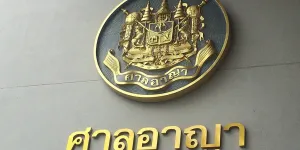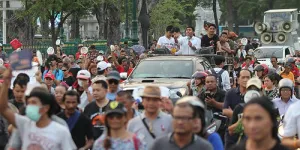By Prachatai |
By iLaw |
<div>
<div>22 civil society organisations have launched a project to collect signatures of Thai citizens in a bid to repeal the junta’s orders that violate human rights and democratic values.</div>
<div> </div>
<div>On 15 January 2018, iLaw, a human rights advocacy group, and its network organisations launched a campaign to abolish over 500 orders of the junta’s National Council for Peace and Order (NCPO). </div>
<div> </div>
<div>Organisations that joined the campaign today include the Southern Peasants Federation of Thailand, the People's Health Movement, the student activist Democ
</div></div>
<p>Amid rumours that the junta will form its own political party to compete in the political arena, the human rights advocacy group iLaw points out that the regime does not need to form a party to prolong its rule.</p>
<p>According to <a href="https://www.facebook.com/iLawClub/photos/a.10150540436460551.646424.299528675550/10159645027905551/?type=3&theater">iLaw</a>, under the new political system, the National Council for Peace and Order (NCPO) does not need to establish a political party to prolong its rule. It can instead rely on the senate.</p>
<p>The military prosecutor has dismissed political charges against a former lèse majesté convict accused of defying a junta order.</p>
<p>Bangkok Military Court on 16 October 2017 held a deposition hearing for Pruetnarin (surname withheld due to privacy concerns), a 30-year-old who was previously sentenced to 14 years and 10 months imprisonment for lèse majesté.</p>
By International Federation for Human Rights (FIDH) |
<p><section><section>
<p>The Thai government should end all lèse-majesté prosecutions and amend Article 112 of the Criminal Code (lèse-majesté) to bring it in line with international law, a United Nations (UN) expert said on 6 October 2017.</p>
</section></section></p>
<p dir="ltr">On top of rising numbers of prosecutions under Thailand’s notorious lèse majesté law, the sedition law has also been used by the military regime to shut down critics since the 2014 coup d’état.</p>
<div>
<div>The National Reform Steering Assembly (NRSA) has presented the junta with its long-anticipated recommendations for developing post-coup Thailand. But iLaw, a watchdog NGO, has pointed out that much of the NRSA’s reform package was merely copied and pasted from other sources.</div>
<div> </div>
<div>Several pages from the 1,342 article long report appear to have been lifted directly from previous reports written by the NRSA’s precursor, the National Reform Council (NRC).
</div></div>
<p>In the three years since the 2014 coup d’état, the regime has disrupted 157 public events, most for being politically sensitive.</p>
<p>According to<a href="https://freedom.ilaw.or.th/blog/banonactivitiesunderncporegime"> iLaw</a>, a human rights advocacy group, from the day of the military coup d’état on 22 May 2014 until 10 July 2017, the junta has disrupted at least 157 public events.</p>
<p>A government watchdog has evaluated Thailand’s junta as ‘stable, prosperous and sustainable’ on the third anniversary of the last coup, warning that elections will not be enough to dismantle the National Council for Peace and Order (NCPO).</p>
<p>iLaw, after monitoring the laws issued by the NCPO over the past three years, describes in <a href="https://ilaw.or.th/node/4506">a new report</a> the numerous mechanisms implemented by the NCPO to <a href="https://prachatai.com/english/node/6461">safeguard its influence </a>no matter the outcome of future elections.</p>
By iLaw |
<div>A labour rights lawyer has been imprisoned for defaming a court, leaving stranded his five-month pregnant wife.
</div>
<div>
<div>At least seven members of the junta-appointed National Legislative Assembly have failed to meet attendance requirements set by the Interim Constitution.
</div></div>


